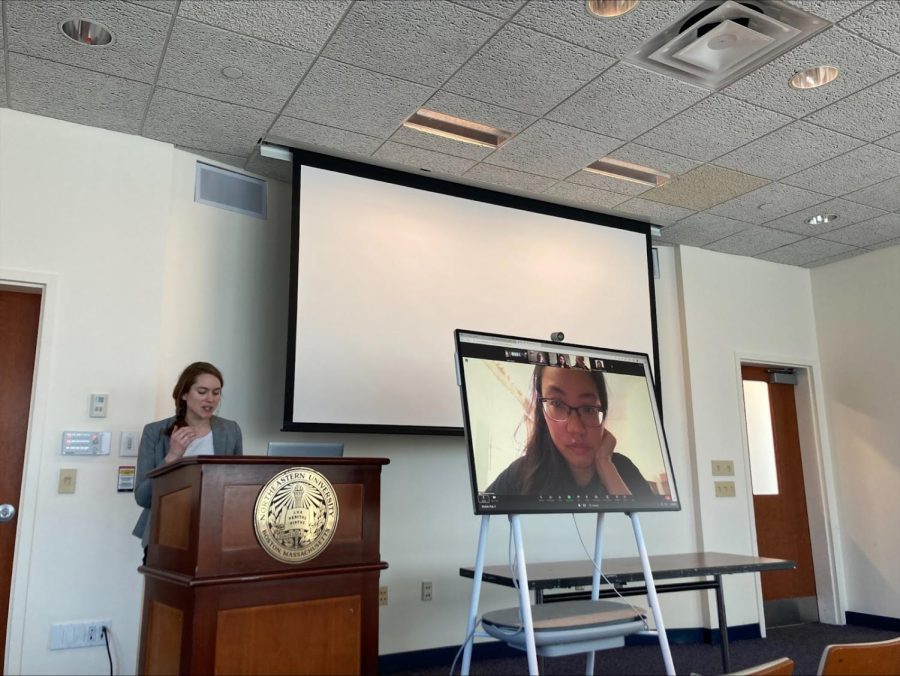‘Girl Talk’ documentary screening empowers women in debate
\
Katy Shorey moderates the Zoom Q&A with “Girl Talk” producer Stephanie Sunate and film subject Gaby Lewis. The documentary followed the high school careers of five teenage girls on Newton South’s high school debate team. Photo courtesy of Claire Ogden.
March 21, 2023
Over 40% of national high school debate students are female, while less than 10% become national champions, according to the documentary “Girl Talk.” Anika Sridhar of Newton South High School was the first girl to win the championship in nine years, at the 2018 Tournament of Champions.
“Girl Talk,” a 2022 documentary directed by Lucia Small, focuses on the fearless journey of five teenage girls on Newton South’s debate team over the course of a four-year period, as they strive to win the national debate championship while navigating the activity’s limiting gender roles.
Northeastern’s Politics, Philosophy, and Economics Program hosted a screening and discussion of the documentary March 16, followed by a Q&A with impact producer Stephanie Sunata and film subject Gaby Lewis, currently a senior at Tufts University.
“I strongly believe that the power of film is in the asking of the questions rather than providing the answers,” Small said in a Ms. Magazine interview.
Film subjects Lewis, Sridhar, Gil Alon, Bella Ehrlich and Hannah Phan came from uniquely diverse backgrounds, sharing one fundamental thing in common: their love for debate and passion to be heard.
“Nobody really knows what debate is,” Alon said in the film.“ It’s actually a lot less glamorous than people think.”
Female debate students often face discriminatory comments regarding the higher-pitched tones of their voices or their lack of makeup in competitions. These remarks can be detrimental to confidence and performance in a highly competitive environment, as conveyed in “Girl Talk.”
Alon was once told her voice was “too feminine for debate” by a judge at a competition.
Despite the challenges of being a woman in debate, Newton South High School promoted a culture of teaching members of the team to feel secure in their own voices and develop their own personalized styles of debate through mentorship by varsity team members to the novices.
“Debating draws us all in, it’s like our own little world with our own little language,” Lewis said.
Phan was adamant throughout the film that her voice was important, and beyond that, a privilege, considering her parents struggled to be treated fairly as immigrants from Vietnam.
The documentary’s dedication to sharing the coming-of-age of these young female leaders grappling with adjusting to adulthood in their own ways led “Girl Talk” to win the Audience Choice Award at the Boston Independent Film Festival in May 2022.
Students from Philosophy 1112: Debating Ethical Controversies and general students interested in the subject filled a classroom in Egan Research Center to watch the screening. Many Northeastern students had their own experiences in high school debate, which helped them find solace in the powerful message of the film.
Katy Shorey, an assistant teaching professor of philosophy at Northeastern, feels debate culture develops over a narrow definition of what success means to the competitor, often becoming a race to the bottom in terms of who can out-shine the other.
“It all seemed very accurate in a scary way,” Shorey said after viewing “Girl Talk.” She has studied ways to reform the activity, asking Sunata and Lewis during the Q&A what tactics they believe could help enact change. Sunata “hopes this film carries on what other people are already doing.”
“I think getting rid of the high pressures of debate can make it more rewarding,” Lewis said. “Both decreasing the physical cost of debate and the culture of devoting one’s entire life to debate is a start.”
Sahiti Tholeti, a fourth-year political science and international affairs combined major, described debate as a “constant mental effort,” navigating how she uses her femininity as an advantage rather than a disadvantage. In doing this, she walks into every NATO competition in a dress and heels, head held high, with opinions ready to share.
“I use the fact that I’m a woman in a room full of men at these competitions to my advantage,” Tholeti said.
Small passed away in November 2022 after a long battle with pancreatic cancer, but rested upon the peaceful thought that “Girl Talk” paves the way for young women to continue challenging the system of gender stereotypes in debate and other political activities.
“It has been my struggle, my whole life, trying to find a voice that I felt comfortable with—that wasn’t alienating, but at the same time, wasn’t apologetic,” Small told Ms. Magazine last June. “I’m still navigating that. But ‘Girl Talk’ was a way for me to look at—when do girls, young women speak up or begin to shut down?” During the Q&A, students asked how Lewis grew into her confidence over her four years on the team, to which Lewis said “Don’t be afraid to think and feel that you can be the best.”


















